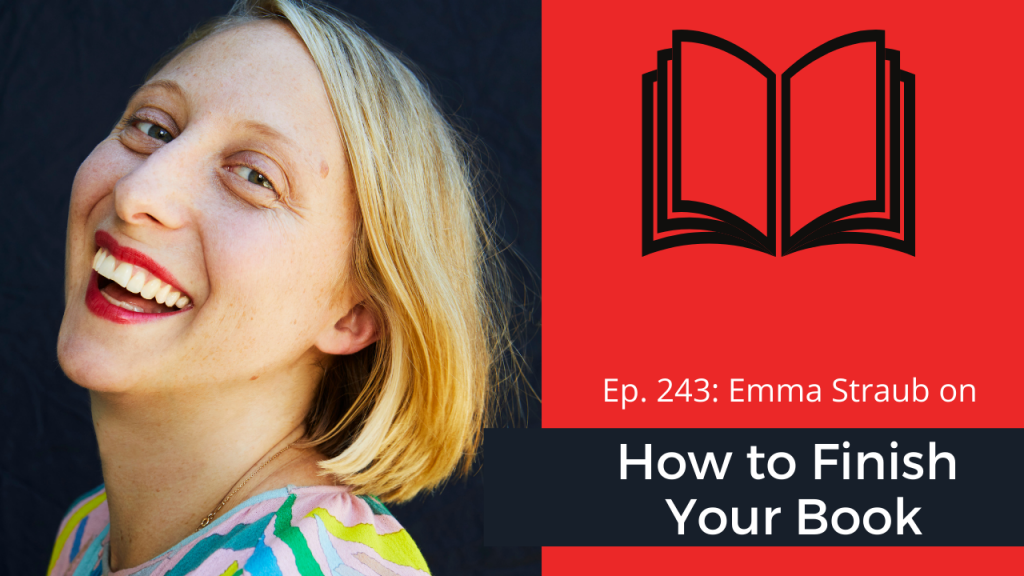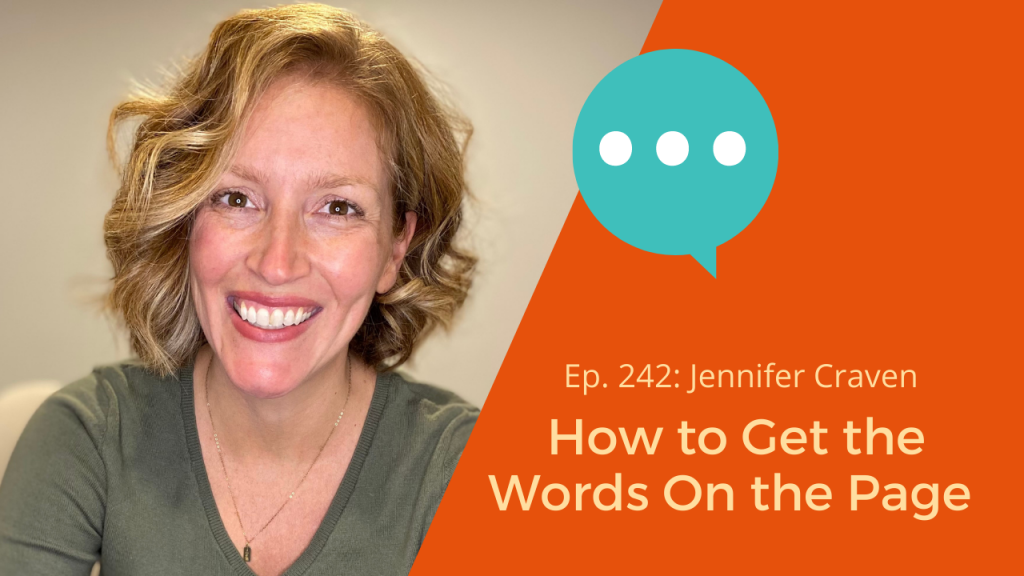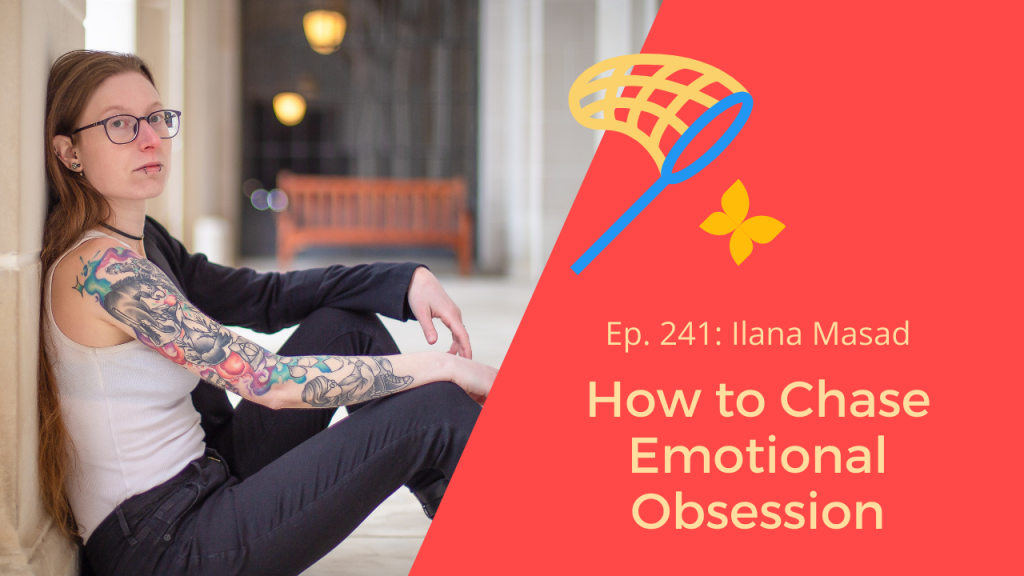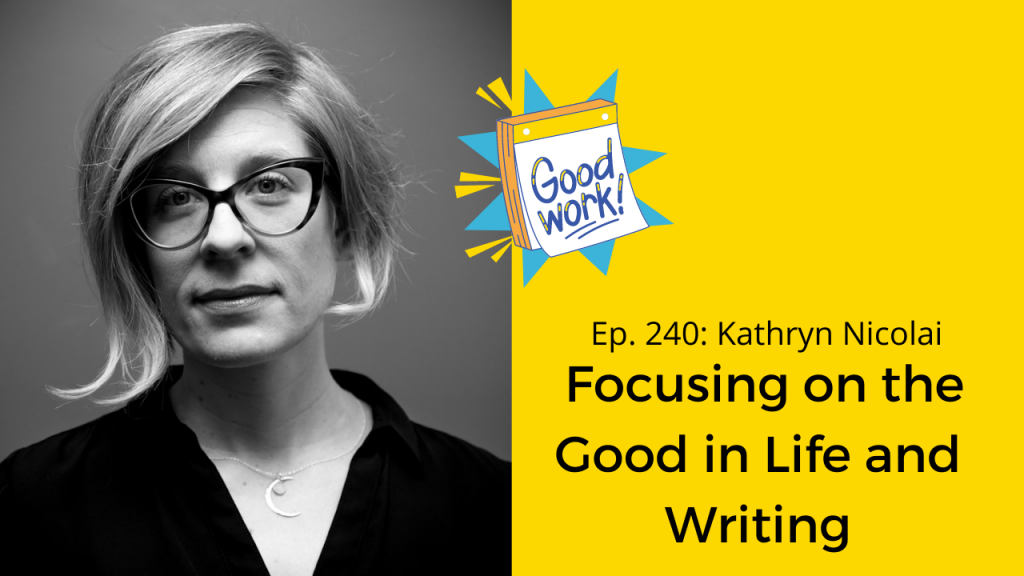Emma Straub is the New York Times-bestselling author of four novels, All Adults Here, Modern Lovers, The Vacationers and Laura Lamont’s Life in Pictures, and the short story collection Other People We Married. Her books have been published in twenty countries. She and her husband own Books Are Magic, an independent bookstore in Brooklyn, New York.
How Do You Write Podcast: Explore the processes of working writers with bestselling author Rachael Herron. Want tips on how to write the book you long to finish? Here you’ll gain insight from other writers on how to get in the chair, tricks to stay in it, and inspiration to get your own words flowing.
Join Rachael’s Slack channel, Onward Writers!

Transcript:
Rachael Herron: [00:00:00] Welcome to “How do you Write?” I’m your host, Rachael Herron. On this podcast, I talk to authors about how they write, what their process is and how their lives fit together. I’ll keep each episode short so you can get back to writing.
[00:00:15] Well, Hello writers! Welcome to episode #243 of “How do you Write?” I’m Rachael Herron. I am way thrilled that you are here today, as I’m talking to Emma Straub. Emma Straub is a blockbuster. She owns an incredible bookstore in New York and she wrote All Adults Here, which is a book that I absolutely loved. So, it’s going to be one of those episodes in which I covell and fangirl, and she’s such a beautiful writer and a beautiful person and I know that you are going to enjoy this interview. Oh my gosh, you can hear me stumbling. I didn’t even prepare notes of what I’m going to talk about because I am so tired. The house closed escrow. So we have sold the house and we’re moving to New Zealand. It’s really happening. I think I wasn’t willing to really believe it until the house sold. And we were so lucky that our house hit the market, sold and closed escrow in three weeks and six days. It did not even go to four weeks. It was all done and dusted. I’m still in the house. We’ve got another 10 days here in the house that we got back from the new owners. I’m sitting in a house that is not my own. It’s a very strange feeling when it’s been yours for 15 years and now it is not. And I was out there at this morning, watering, not my garden, before the heat of the day. It’s very strange. But that’s been really exciting. And so that was a couple of days ago that happened. So, I guess now we have to move to New Zealand. So, we’re doing that. [00:01:55] Let’s see, what else is going on around here? I am still somehow continuing to work and it’s going well. I am working on the revision of A Life in Stitches, adding a couple of essays and you might be able to hear that my voice is super tired. I am doing the audio book narration for it, which I am exceedingly excited about and it’s going great. The publisher never, I think I may have mentioned this last week, forgive me, but the publisher never did an audio book of this book, which was ridiculous. And it was something I was so irritated with them about because knitters and crafters listened to audio books before the rest of the world embraced the new audio revolution. The crafters had always been there and they always wanted this book in audio book. So now that I got the rights back, I get to do it. And now, that we’re in this house with empty closets, I took the closet furthest away from the street, I lined it with moving blankets, using this method that is really working well. And I will just say it here really quickly. I’m using command hooks to hang a cafe curtain rings with little hooks on them, with little, what are they called? Like pinchers. Clasps, and then kind of, I am connecting them to moving blankets. So everything is removable, which is important because it’s all fresh paint in that closet. But when I’m done, I just unhook the blankets, take off the command strip because those come off clean and then it’s like, I was never in there and I have this awesome audio booth set up. It sounds great. And I am truly enjoying the experience of reading this book. What I’m really enjoying is the experience of making this book. That was good. It was really good. I was proud of it, but I’m making it a little bit better and I get to use my voice to bring it to life. And that is just one of my favorite things to do. Y’all know that. [00:03:57] You all hear me extemporaneously and speaking too quickly and stumbling over my words. But when I get to do books and actual, really, really reading of what I’ve written, and that’s one of the things I love to do best. I’m going to tell you a tiny, tiny little story. I was in college. I was not even in college, I’m in community college at this point because I couldn’t bear to leave my mama go to a four-year college yet. I wasn’t ready. So I went to this community college and I was taking English 1, you know, probably the very first thing. And we read in that a story that I’d read a million times before, Steinbeck’s Chrysanthemums and it’s a story that I love and this kind of bored professor, we were going to read it in class out loud and he were going to move around the room. And, you know, one person would read a couple of paragraphs and then the next one, he would move it and somebody else would read. Somebody read the first few paragraphs, I took over two paragraphs in, and then after I was done doing my part and I kind of paused to see if he wanted me to stop. He said, do you want to continue? And so, I read a couple more and then I remember this so clearly, I’m like, you know, 18, but he said to the class, he said, do you want her to continue? And they all, they said, I heard them like, do this noise. I was like, yeah, yeah, yeah. And maybe they were just saying that because they didn’t want to read out loud. But I loved reading that story out loud with emphasis, with passion, with emotion and when I was done, there was a silence and then they clapped and then afterwards a woman followed me outside and she said that it had made her cry. And I remember thinking, I’m reading words that I love and I’m putting my own expression into them. And how cool is that? And now, I get to do that in my own closet, in the back, reading essays that are important to me, reading fiction. I don’t know if I’m ever going to be ready to do that. But reading things, something that I wrote that I love that I’m passionate about. [00:06:05] So that’s been really, really fun and I’m getting a lot of work done on it. I’m hoping to finish it. I’m not hoping to finish it, I need to finish it by the end of next week. Because then we will be getting rid of everything in the house, including the stage furniture. There will be nothing in the closets including a recording studio. So I record this, I’m recording this on Thursday. By the time I talk to you next Thursday, I hope that I have it done and pushing it a little bit because I’m still continuing edits. I haven’t quite finished that either. So, I’m kind of editing and then recording and then editing and then recording and it’s fun. And I guess it’s giving me a place to put all this nervous energy that is coming out my pores. So, that’s, what’s going on around here. Let us jump into the interview with Emma Straub. I hope that you really enjoy it. Have as much as I enjoyed talking to her. She’s truly awesome. So, I wish you, my friends happy writing and we will talk soon. [00:07:03] Do you wonder why you’re not getting your creative work done? Do you make a plan to write and then fail to follow through? Again? Well, my sweet friend, maybe you’d get a lot out of my Patreon. Each month, I write an essay on living your creative life as a creative person, which is way different than living as a person who’ve been just Netflix 20 hours a week and I have lived both of those ways, so I know. You can get each essay and access to the whole back catalog of them for just a dollar a month. Which is an amount that really truly helps support me at this here writing desk. If you pledge the $3 level, you’ll get motivating texts for me that you can respond to. And if you pledge at the $5 a month level, you get to ask me questions about your creative life, that I’ll answer in the mini episodes. So basically I’m your mini coach. Go to patreon.com/Rachael (R A C H A E L) to get these perks and more and thank you so much.Rachael Herron: [00:08:01] All right. Well, I could not be more pleased to welcome to the show today. Emma Straub. Hello, Emma!
Emma Straub: [00:08:06] Hi! Hi
Rachael Herron: [00:08:09] Listeners, we have just gotten deep before the show on things like New Zealand and most importantly, cats. So, I, Emma’s already my best friend, but she’s not your best friend yet. She will be after this interview. Let me give you a little introduction so you know about her. Emma’s job is the New York Times-bestselling author of four novels, All Adults Here, Modern Lovers, not Levels, The Vacationers and Laura Lamont’s Life in Pictures, and the short story collection Other People We Married. Her books have been published in twenty countries. She and her husband own Books Are Magic, an independent bookstore in Brooklyn, New York. Welcome Emma.
Emma Straub: [00:08:47] Oh, thanks for having me.
Rachael Herron: [00:08:49] I’m so excited. I’ve been so excited to talk to you because Modern Lovers has just been one of those books in my TBR pile forever and I haven’t gotten around to it. And I apologize for that. That is going to be immediately remedied because your publicist sent me a net galley for the upcoming paperback of All Adults Here. And I am in love, Emma. Your book is exactly what I needed to read right now, I fell into it with such excitement and gratitude. And so it’s one of those things, it’s one of those books, listeners that in the first scene, you’re like, no, yup, here I am, 100% committed. I’m not going to touch another book until this book is done. And in fact, I’ve kind of been having a crappy day and I promised myself after we talked, I’m getting in bed with your book and I’m not getting out for the rest of the afternoon. So, first and foremost, thank you for being my new favorite writer. I don’t mean to scare you, but you really are amazing. You’re amazing.
Emma Straub: [00:09:51] It’s going to take way more than that to scare me.
Rachael Herron: [00:09:56] Good. Oh, that’s wonderful. You’ll hear my cat soon, that might work. Okay, so let’s talk about your writing process. This is a show for writers and we love to talk about process. I’m kind of a junkie for that question that we kind of roll our eyes when we get asked, but then we love to answer it. You know, what is your writing process? Can you tell me what your writing process is now, like now during the weirdness of the world?
Emma Straub: [00:10:23] So when I was a youth, I used to be precious. I used to be precious about my writing process and I would only write in bed like Virginia Wolf and
Rachael Herron: [00:10:41] Oh I love that
Emma Straub: [00:10:43] a book with a cat or two, and I needed total silence and etc. And then I had children and it turned out that that was a lot harder to come by.
Rachael Herron: [00:11:00] Yeah. I’ve heard this rumor.
Emma Straub: [00:11:03] Yeah. And by the time I was on my, by the time I was on my third novel, when I was writing Modern Lovers, I was writing it like on the subway, like literally anywhere. Literally anywhere where there were no small children that were related to me. And now, you know, so for the first, let’s say six months of the pandemic, I didn’t write a word because I have a five-year-old and a seven-year-old and all of a sudden, I was doing school while husband was at the bookstore, keeping that going, which is no small feat last year. I mean, you know, it’s funny. We like, sometimes we get into like, arguments about like, who was more miserable.
Rachael Herron: [00:12:12] Who usually wins?
Emma Straub: [00:12:14] I mean, that’s the thing, it’s a problem. I mean, I would say I,
Rachael Herron: [00:12:17] I think you do.
Emma Straub: [00:12:19] I would say, I win, but he was like, I would say my like emotional labor was more intense but he was doing like more physical labor, which was intense and I don’t, I mean, it was bad all the way around is what we ultimately come to usually, depending on who’s having a worst day. But so, the first, you know, from March until like September, October, I didn’t write a word because I had no minutes in which to do so. But then in the fall, my, so one of my kids was in school five days a week, starting in September and the other one started totally remote. And then has, it has like worked its way up. So now they’re in school four days a week. God, it’s so boring. I’m sorry. It’s like,
Rachael Herron: [00:13:33] This is not so boring. This is fascinating. But, I have just a quick question. What kind of writer are you when you’re not writing? Are you a grumpy one or are you just like kind of bobbing along?
Emma Straub: [00:13:44] I would say I’m bobbing along mostly because, but unhappily, like I’m bobbing along unhappily because I really love to work. I really love to work. Like I love to write. It’s my favorite thing. Like it’s,
Rachael Herron: [00:14:02] It shows, it shows in your writing.
Emma Straub: [00:14:06] I know. So, but yeah, so, okay. So basically once school was like reintroduced as a concept and we hired a wonderful, beautiful babysitter who could help, then, my, like professional life started to seem possible again. And then I started writing and yeah, I mean, I, what I’m writing now is so wild. It’s so different. And I think like, I think that this is, I think it’s going to be really, really interesting to be a reader in the next, let’s say five years.
Rachael Herron: [00:14:55] I have thought the same thing. Yeah.
Emma Straub: [00:14:57] It is like, I mean, like if I am writing what I’m writing, like, it’s going to like I’m writing a book, that is time travel with has time travel. And like, if like I, who knows, like just people are going to be writing some wild, wild stuff and it is going to be really exciting and interesting to see how everyone is like processing the trauma of this year, you know?
Rachael Herron: [00:15:37] Yeah, I’m at once right now, I’m trying to balance two proposals. One is the happiest, most up-lit book I’ve ever written. And one is the darkest book I’ve ever heard talk about and in, up to, and including like, my wife won’t let me talk about the book in the house.
Emma Straub: [00:15:54] Oh my God, oh my god, that’s going to be a problem.
Rachael Herron: [00:15:58] I think that might be a problem, but I think we are really just we’re all writing those peaks and valleys. Where did you write before all of this happened? Were you an outside cafe writer or were you an inside? Have you had to adjust to that?
Emma Straub: [00:16:11] I have always been an inside person, but last, I guess I wrote most of All Adults Here in a coworking space that I could walk to. And it was perfect because it got me out of the house and I could drop my kids off at school and then keep walking and it was like a nice walk from home.
Rachael Herron: [00:16:43] I had a coworking space for three weeks before the pandemic, I had just made the decision to do it. And I would take Bart there and take the train and it was like, you know, two stops. But did yours survive? Mine closed.
Emma Straub: [00:16:56] No, mine closed too. And you know, I think that like, I mean, one good side, if we can call it that, is that like, I am now able to work at home. Like, before I would have said, oh, I can’t work at home, but I can and I do. And actually, I bought something recently, just a couple of months ago that really changed my whole game.
Rachael Herron: [00:17:24] Tell me it was an Alpha Smart.
Emma Straub: [00:17:26] I don’t know what that is.
Rachael Herron: [00:17:28] Oh, that’s a different topic for a different day. Tell me what yours is.
Emma Straub: [00:17:31] I’ll be next, whatever that is. It sounds like a robot that writes my books for me.
Rachael Herron: [00:17:37] Yeah. That I, that I would like to buy. I can’t afford that one actually.
Emma Straub: [00:17:41] Yeah, I’m looking for that one, but I bought myself a treadmill for my, and an adjustable desk. So, I just walk on my treadmill. I don’t go faster than that because, but I love to walk and I just, I don’t really have time ever for anything. But now, I can walk for, you know, a half an hour or an hour maybe, and then sit for a while and walk and sit, and then I can write. I’m going slow enough that I can write. I can type and,
[Read more…] about Ep. 243: Emma Straub on How to Finish Your Book

